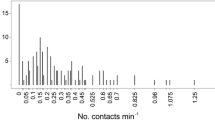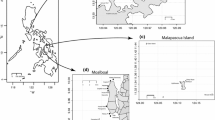Abstract
Diving-related activities may constitute a major threat to coral reefs. This study aimed to quantify the impact of diving in Hong Kong on hard corals and understand how socio-economic characteristics and experience level of divers influence diver-inflicted damage. We recorded and analysed the underwater behaviour of 81 recreational divers. On average, a diver was in contact with marine biota 14.7 times with about 40 % of contacts involved corals and 38 % were damaging contacts with corals or other biota in a single dive. The most harm-inflicting groups included inexperienced and camera-carrying divers. Although Hong Kong divers did not make many damaging contacts with corals, there is still an imminent need to determine the scale of damage from diving activities on the marine ecosystem given the rapid development of marine-based tourism and the limited coral-inhabited areas in Hong Kong where the marine environment is already under stress from anthropogenic activities.





Similar content being viewed by others
References
Agriculture, Fisheries and Conservation Department (2004) Not to anchor in “No anchoring Area” of Ung Kong Wan. Government Printer, Hong Kong
Agriculture, Fisheries and Conservation Department (2011) Hong Kong reef check 2011: results summary. http://www.afcd.gov.hk/english/conservation/con_mar/con_mar_cor/con_mar_cor_hkrc/con_mar_cor_hkrc5.html. Accessed 9 Nov 2012
Allison WR (1996) Snorkeler damage to reef corals in the Maldive Islands. Coral Reefs 15:215–218
Ang PO Jr, Choi LS, Choi MM, Cornish A, Fung HL, Lee MW, Lin TP, Ma WC, Tam MC, Wong SY (2004) Hong Kong. In: Japan Wildlife Research Centre (ed) Status of coral reefs in East Asian Seas region, Chap 3.2. Ministry of the Environment, Tokyo, pp 121–152
Barker NHL (2003) Ecological and socio-economic impacts of dive and snorkel tourism in St. Lucia, West Indies. PhD Thesis, University of York
Camp E, Fraser D (2012) Influence of conservation education dive briefings as a management tool on the timing and nature of recreational SCUBA diving impacts on coral reefs. Ocean Coast Manag 61:30–37
Census and Statistics Department (2011a) Hong Kong statistics: education. http://www.censtatd.gov.hk/FileManager/EN/Content_809/education.pdf. Accessed 13 June 2011
Census and Statistics Department (2011b) Hong Kong statistics: population. http://www.censtatd.gov.hk/hong_kong_statistics/statistical_tables/index.jsp?charsetID=1andtableID=001andsubjectID=. Accessed 13 June 2011
Census and Statistics Department (2011c) Product and services: quarterly report on general household survey. http://www.censtatd.gov.hk/products_and_services/products/publications/statistical_report/labour/index_cd_B1050001_dt_back.jsp. Accessed 13 June 2011
Chan ALK, Chan KK, Choi CLS, McCorry D, Lee MW, Ang PJ (2005) Field guide to the hard corals of Hong Kong. Agriculture, Fisheries and Conservation Department, Hong Kong SAR Government and Cosmos Book Ltd., Hong Kong
Dixon JA (1993) Economic benefits of marine protected areas. Oceanus 36:35–40
Fabricius KE, McCorry D (2006) Changes in octocoral communities and benthic cover along a water quality gradient in the reefs of Hong Kong. Marine Pollut Bull 52:22–33
Garrabou J, Sala E, Arcas A, Zabala M (1998) The impact of diving on rocky sublittoral communities: a case study of a bryozoan population. Conserv Biol 12(2):302–312
Guzner B, Novplansky A, Shalit O, Chadwick NE (2010) Indirect impacts of recreational scuba diving; patterns of growth and predation in branching stony corals. Bull Marine Sci 86(3):727–742
Hall VR (2001) The response of Acropora hyacinthus and Monitpora tuberculosa to three different types of colony damage: scraping injury, tissue mortality and breakage. J Exp Marine Biol Ecol 264:209–223
Harriott VJ, Davis D, Banks SA (1997) Recreational diving and its impact in marine protected areas in Eastern Australia. Ambio 26(3):173–179
Hasler H, Ott JA (2008) Diving down the reefs? Intensive diving tourism threatens the reefs of the northern Red Sea. Marine Pollut Bull 56:1788–1794
Hawkins JP, Roberts CM (1992) Effects of recreational scuba diving on fore-reef slope communities of coral reefs. Biol Conserv 62:171–178
Hawkins JP, Roberts CM (1994) The growth of coastal tourism in the Red Sea: present and future effects on coral reefs. Ambio 23(8):503–508
Hawkins JP, Roberts CM (1997) Estimating the carrying capacity of coral reefs for scuba diving. In: Proceedings of the 8th international coral reef symposium 2, Smithsonian Tropical Research Institute, Balboa, Panama, pp 1923–1926
Hawkins J, Roberts CM, Van’t Hof T, de Meyer K, Tratalos J, Aldam C (1999) Effects of recreational scuba diving on Caribbean coral and fish communities. Conserv Biol 13:888–897
Jameson SC, Ammar MSA, Saadalla E, Mostafa HM, Riegl B (2007) A quantitative ecological assessment of diving sites in the Egyptian Red Sea during a period of severe anchor damage: a baseline for restoration and sustainable tourism management. J Sustain Tour 15(3):309–323
Ko V (2011) Extended controls on fishing urged. South China Morning Post, 13 June 2011
Leujak W, Ormond RFG (2008) Quantifying acceptable levels of visitor use on Red Sea reef flats. Aquat Conserv Mar Freshw Ecosyst 18:930–944
Liddle M (1997) Recreation ecology: the ecological impact of outdoor recreation and ecotourism. Chapman & Hall, London
Liddle MJ, Kay AM (1987) Resistance, survival and recovery of trampled corals on the Great Barrier Reef. Biol Conserv 42:1–18
Mathieson A, Wall G (1982) Tourism: economic, physical and social impacts. Longman, New York
Morton B, Morton J (1983) The sea shore ecology of Hong Kong. Hong Kong University Press, Hong Kong
Mundet L, Ribera L (2001) Characteristics of divers at a Spanish resort. Tour Manag 22:501–510
O’Reilly AM (1986) Tourism carrying capacity: concept and issues. Tour Manag 7:254–258
Plathong S, Inglis GJ, Huber ME (2000) Effects of self-guided snorkelling trails on corals in a tropical marine park. Conserv Biol 14(6):1821–1830
Poonian C, Davis PZR, McNaughton CK (2010) Impacts of recreational divers on Palauan coral reefs and options for management. Pac Sci 64:557–565
Riegl B, Velimirov B (1991) How many damaged corals in Red Sea reef systems? A quantitative survey. Hydrobiolgia 216(217):249–256
Roberts L, Harriott VJ (1994) Recreational scuba diving and its potential for environmental impact in a marine reserve. In: Bellwood O, Choat H, Saxena N (eds) Recent Advances in marine science and technology ’94. Townsville, pp 695–704
Rouphael T, Inglis G (1995) The effects of qualified recreational SCUBA divers on coral reefs. Technical Report No. 4. CRC Reef Research Centre Ltd., Townsville
Schleyer MH, Tomalin BJ (2000) Damage on South African coral reefs & an assessment of their sustainable diving capacity using a fisheries approach. Bull Marine Sci 67(3):1025–1042
Talge H (1993) Impact of recreational divers on scleractinian corals at Looe Key, Florida. In: Richmond RH (ed) Proceedings of the 7th international coral reef symposium, vol 2, Guam, pp 1077–1082
Thapa B, Graefe AR, Meyer LA (2006) Specialization and marine based environmental behaviours among SCUBA divers. J Leis Res 38(4):601–615
Tratalos JA, Austin TJ (2001) Impacts of recreational SCUBA diving on coral communities of the Caribbean island of Grand Cayman. Biol Conserv 102(1):67–75
Walters RDM, Samways MJ (2001) Sustainable dive ecotourism on a South African coral reef. Biodivers Conserv 10(12):2167–2179
Woodland DJ, Hooper JNA (1977) The effect of human trampling on coral reefs. Biol Conserv 11:1–4
Worachananant S, Carter RW, Hockings M, Reopanichkul P (2008) Managing the impacts of SCUBA divers on Thailand’s coral reefs. J Sustain Tour 16(6):645–663
Zakai D, Chadwick-Furman NE (2002) Impacts of intensive recreational diving on reef corals at Eilat, northern Red Sea. Biol Conserv 105:179–187
Acknowledgments
This research was supported by the Environment and Conservation Fund, Hong Kong (ECF Project 9/2009) and the Faculty Research Grant of Hong Kong Baptist University (FRG1/11-12/018). The authors thank the volunteer divers who helped conduct the underwater observations: Ko-kwan Chan, Marcus Chan, Wilco Cheung, Eian Kee, Hoi-ling Ma, Mimi So, Alan Tam, Joe Wan and Sarah Yiu.
Author information
Authors and Affiliations
Corresponding author
Additional information
Mr. Alfred (Cheuk-sun) Au deceased.
Rights and permissions
About this article
Cite this article
Chung, Ss., Au, A. & Qiu, JW. Understanding the Underwater Behaviour of Scuba Divers in Hong Kong. Environmental Management 51, 824–837 (2013). https://doi.org/10.1007/s00267-013-0023-y
Received:
Accepted:
Published:
Issue Date:
DOI: https://doi.org/10.1007/s00267-013-0023-y




